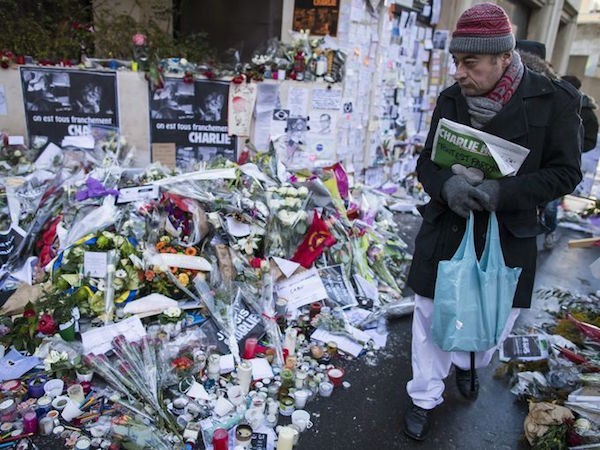Junior Tegan Webster was celebrating her birthday with five other SMU students in London on Nov. 13, 2015. It was the night before her twenty-second birthday, and Webster and her friends gathered in an Airbnb apartment. What should’ve been a night of festivity with close friends came to a halt when out of the blue, Webster received an alarming text from a friend back in the U.S.: “Tegan! Are you ok? Please tell me you’re safe.”
Webster and her friends were extremely alarmed by the worried text and immediately turned on the television to see news reports on the Paris Terror Attacks, where members of the Islamic State killed 130 people and injured 368 more.
“We were shocked and devastated since this was our beloved city. It was our city that was under attack,” Webster said.

Webster is studying abroad in Paris this semester through IES Abroad and was spending time in London over her program’s fall break. The attacks came as a surprise to everyone.
“It felt a bit like a war zone when I came back,” Webster said. “People looked so somber with their heads down. A woman in my building had tears in her eyes each day following the attacks for a week.”
While the terrorist attacks have already unfolded in Paris, students should still be on alert. The SMU Study Abroad office and students currently studying abroad offered the Daily Campus their own tips on how to navigate Europe during a time of fear and the threat of further terrorist attacks.
There are currently 11 SMU students studying abroad in Paris this fall, and all 11 were safe in the attack.
The SMU Abroad Office provides students with many recourses to ensure their safety while overseas. Students are encouraged to register their travel with the nearest U.S. Embassy or Consulate through the U.S. Department of State Traveler Enrollment Program, also known as STEP. After enrolling in STEP, students will receive travel alerts and warnings about the country they’re in or traveling to. SMU also has a Travel Oversight Committee that closely tracks international incidents and updates from the U.S. State Department and local authorities overseas.

Additionally, all SMU students are covered by International SOS (I-SOS), which is safety and medical travel assistance that can be used worldwide during students’ time abroad. All undergraduate SMU Abroad students must register their travel schedules and emergency contact information in the I-SOS database.
SMU students are provided a laminated card with I-SOS contact information to be kept with them at all times. If a student abroad finds himself or herself in an unsafe situation, the student should immediately contact one of the I-SOS emergency numbers to get help. I-SOS will promptly ascertain the student’s whereabouts and respond appropriately.
“Every SMU-approved study abroad program has emergency preparedness protocols and provides students with site-specific security information,” said Catherine Winnie, the director of SMU Abroad.
SMU Abroad emphasizes the importance of students informing their specific program directors of their travel itineraries so that their program can contact them and know their location. Hartnett and Webster’s programs both had individual check-in protocols during the Paris attacks, where each student was required to confirm that they were safe via phone call or email. Webster’s program brought in therapists that students could talk to. Students were allowed to miss classes for three days following the attacks.
“At SMU Abroad, we emphasize with students the resources available to support them, including International SOS, the U.S. State Department, our partner programs abroad and the SMU Travel Oversight Committee,” Winnie said. “A critical part of this experience is staying informed.”
The U.S. State Department encourages all U.S. citizens around the world to be vigilant while traveling and to be informed of personal security, especially in light of the recent terrorist attacks.
“Simply downloading BBC news and getting automatic updates makes you more aware of the foreign community you are going to be living in,” said SMU junior Madeline Hartnett, who is currently studying abroad in London.
Other useful sources while traveling abroad are Travel Security and citizeninfo, which email security and safety updates to their subscribers. After the Paris Attacks, the SMU Abroad office also sent students updates on the security levels of different countries and advice on how to handle another emergency situation.
“What happened has made me open my eyes to international politics more than I believe it would have if this happened while I was at SMU or back at home in California,” Hartnett said. “I can’t remember a time when I was scared to go out in public when I was at home in the U.S. But, now that’s not the case anymore.”

Hartnett said she’s been on edge traveling around London since the city has been on high alert recently. Since firearms are illegal in the UK, only a small percentage of police officers carry handguns. Since the Paris attacks, however, Hartnett has noticed armed police officers in regularly crowded areas of London, especially those that attract tourists.
The same sense of heightened security is apparent in Paris.
“I see men from the French Army carrying armed weapons on the metros that I take to and from my internship, guard dogs and security guards outside every shopping mall, and policemen everywhere,” Webster said. “After realizing that Paris has more protection now than ever before, my fears went away.”

Before students go abroad, the SMU Abroad Office holds mandatory pre-departure orientations regarding security abroad. In these meetings, students are provided with country-specific security, safety and health information. Students also meet with a member of the SMU Police Department who specializes in emergency management and faculty member Joshua Rovner, who does research on security and terrorism.
Rovner, who’s written on the war against al Qaeda and U.S. strategy in the wars in Iraq and Afghanistan, said students planning to study abroad should research the threat of terrorism as well as other security risks, but they shouldn’t let the small threat of terrorist violence stop them from studying abroad.
According to Rovner, in the last five years less than twenty Americans have been killed in terrorist attacks while abroad.
“While every death is terrible, that is a tiny number compared to other risks,” Rovner said.
Rovner said the majority of terrorist attacks occur in countries like Syria, Iraq, Nigeria, Afghanistan, Pakistan and Somalia. He discourages students from traveling to these countries or any other countries with an active war zone.
“I would not allow these attacks to dissuade anyone from studying abroad in general,” said Hartnett. “I would just advise students that are studying abroad to be knowledgable about where they are going to be and where they would like to travel.”
Webster said that when you let fears stop you from discovering more of Paris, you’re giving into what the terrorists want.

“I’m not ready to go home,” she said. “ I still need to check off the final things to do on my bucket list.”








